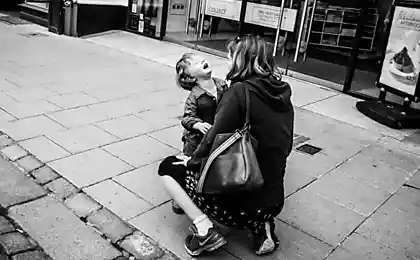315
Basic trust in the world is a prerequisite for a happy life
Trust in peace is a necessary basis for life
According to Erikson, the degree to which a child develops a sense of trust in others and the world depends on the quality of maternal care he receives.
I quote: “... mothers build a sense of trust in their children through such treatment, which in its essence consists of a sensitive concern for the individual needs of the child and a distinct sense of herself as someone who can be trusted, in the sense of the word “trust” that exists in a given culture in relation to a given lifestyle. Thanks to this, the child lays the foundation for the feeling of “all is well”; for the emergence of a sense of identity; for becoming what he will become, according to the hopes of others. (Erikson, 1963)
Erickson also emphasizes that infants must trust not only the outside world, but also the inner world, they must learn to trust themselves and especially must acquire the ability to ensure that their organs effectively cope with biological urges.
584975
Unsuccessful survival of the crisis contributes to the appearance in the child of a psychosocial attitude of fear, suspicion and fear for their well-being.
This attitude is directed both at the world as a whole and at individuals; it will manifest itself in its fullness in the later stages of personal development.
Basic trust is formed in the first few years of a child’s life (different researchers determine the duration of this period in different ways – from one year to 3), if there is no “cliff” in contact with the mother and the baby feels her love.
It is even believed that about the first five months of life, the child does not perceive himself as a separate being from his mother.
The child trusts the world in the face of adults. From birth, the child knows that the mother is always there and can always come to him, once he calls for help, he can trust her; he knows that he will never be alone.
If this happens, then the child eventually develops trust in other people - first to close relatives, then to acquaintances, friends, and then to people in general.
If this deep, unconscious trust in the mother is not formed, then the formation of trust in other people will be very difficult, if at all. And when such a child grows up, it will be difficult for him to trust people, to open up to them.
Trust is always a two-way process, and if a grown-up child can not trust anyone, then very few people will trust him. It is easy to assume that such a child, and then an adult, will probably have great problems with communication. It is very likely that it will be difficult for him to make friends, communicate with the opposite sex.
It is difficult for him to trust people, and if he tries to be sociable and friendly, then deep down, without even realizing it, this person still believes that “the world is a dangerous place and you can not trust others because they will cheat anyway.”
“Children abandoned by their parents but given normal life support care did not want to live. They appeared manifestations of various diseases, the causes of which doctors could not explain from a medical point of view (this phenomenon is called hospitalism).
Another French psychologist, René Spitz, studied children in children's homes and in good nursery facilities with a large number of attendants. Children from the children's homes lagged far behind in mental development. Although the care, nutrition and hygienic conditions in these facilities were good, the mortality rate was very high. By age 2, many of them had died of hospitalization. Psychologists have had a hard time understanding that this is because children don’t understand what happened to them or where their mother is.
After psychologists talked about the situation even to children of several months of life and restored cause-and-effect relationships, the children decided to die. ?
Reliable attachment of the child to the mother in the first years of life lays the foundation for a sense of security and trust in the world around him. Such children already in early childhood show sociability, ingenuity, ingenuity in games.
In preschool and adolescence, they demonstrate leadership traits, differ in initiative, responsiveness, empathy, and are popular among peers.
Study of trust in domestic psychology
In Russian psychology, trust for the first time became the subject of independent socio-psychological analysis in the theory of T.P. Skripkina. In her opinion, the psychological essence of trust makes it possible to fully comprehend the ways of connecting the individual with the world, the laws of mastering the cultural space within which he can only find his generic human essence and at the same time remain an independent true “subject of life” (S.L. Rubinstein), and not a subject of “alienated activity” (E. Fromm). Its essence is represented in the ratio of confidence measures to the world and to oneself. The main conditions for the emergence of trust are the actual importance of the trust object and its evaluation as safe. In the works of T.P. Skripkina, the phenomenon of distrust was not separately highlighted.
Trust is a form of faith that represents in socio-psychological terms an independent type of attitude-attitude to the world and to oneself. The opposite is mistrust.
Distrust includes the following main elements:

© Elena Shumilova
The first indicator of the attitude to trust in the world is the readiness of the baby to calmly bear the disappearance of the mother from sight.
In order to establish trust, it is necessary to “establish a balance between the child’s need to receive and the mother’s need to give.” The mother must treat the child in an unmistakable language of inner connection ... thus the first self, called the sense of basic trust, arises – this is the first and basic value, which seems to imply that there must be an experience interrelated with kindness inside and outside. This experience allows the child to form the confidence that he is not alone. Even if the mother is not around, he feels safe because she has become an inner certainty and external predictability.
The child must feel for what behavior he is praised and punished, and believe that the reaction of parents to his behavior has a certain meaning. Only then will he be able to predict the behavior of parents, which will serve as a basis for confidence in the safety, stability and predictability of the world.
Among the reasons that determine the formation of basic trust, Erikson also notes the ability of parents to “manage prohibition and permission” and “represent to the child the depth of a certain inner belief that there is meaning in what they do.” The child must feel for what behavior he is praised and punished, and believe that the reaction of parents to his behavior has a certain meaning. Only then will he be able to predict the behavior of parents, which will serve as a basis for confidence in the safety, stability and predictability of the world. If the infant does not receive a response to his needs, he develops a basic distrust of the world, which, according to Erikson, in childhood is accompanied by total anger, fantasies of destruction and vandalism, and in adulthood manifests itself in alienation, inability to get along with themselves and others. If a child in infancy sees the world as contradictory and painful, he or she decides forever that life is dangerous, unpredictable and untrustworthy.
If a child in infancy sees the world as contradictory and painful, he or she decides forever that life is dangerous, unpredictable and untrustworthy.
Thus, a person’s distrust of himself, based on the contradiction of consciousness and the unconscious, thoughts and feelings, is laid in the child’s experience, when the child receives the love of parents only under the condition of assimilating certain forms of behavior. Gradually, this leads to ignoring their own experiences, as well as to various discrepancies in the personality of the child. Such discrepancies can be many. A typical example is the mismatch between the social role of a teenager and his appearance. For example, when an excellent student, whom everyone used to see quiet and calm, suddenly becomes a representative of some aggressive subculture.
In adolescence, all the difficulties that the child had in previous stages of development can be actualized. Among them, the emergence of problems associated with distrust is likely. Trust plays an important role in the communication of teenagers: without the first, the second loses all meaning.
For the normal development of the personality of a teenager, adequate self-esteem is important, which is formed in the process of his contacts with other people. But this communication does not always develop properly, and the reason often lies in the teenager himself. They may worry too much about their appearance, character, or incompetence. At the same time, it seems to him that the communication partner necessarily thinks about these “difficulties”. It can be assumed that this kind of “difficulty” occurs in adolescents if they do not trust those with whom they communicate. After all, trust always implies a value attitude towards the personality of another person. published
Author: Maria Aslamova
P.S. And remember, just by changing your consciousness – together we change the world!
Source: www.b17.ru/article/bazovoe_doverie_k_miru/
According to Erikson, the degree to which a child develops a sense of trust in others and the world depends on the quality of maternal care he receives.
I quote: “... mothers build a sense of trust in their children through such treatment, which in its essence consists of a sensitive concern for the individual needs of the child and a distinct sense of herself as someone who can be trusted, in the sense of the word “trust” that exists in a given culture in relation to a given lifestyle. Thanks to this, the child lays the foundation for the feeling of “all is well”; for the emergence of a sense of identity; for becoming what he will become, according to the hopes of others. (Erikson, 1963)
Erickson also emphasizes that infants must trust not only the outside world, but also the inner world, they must learn to trust themselves and especially must acquire the ability to ensure that their organs effectively cope with biological urges.
584975
Unsuccessful survival of the crisis contributes to the appearance in the child of a psychosocial attitude of fear, suspicion and fear for their well-being.
This attitude is directed both at the world as a whole and at individuals; it will manifest itself in its fullness in the later stages of personal development.
Basic trust is formed in the first few years of a child’s life (different researchers determine the duration of this period in different ways – from one year to 3), if there is no “cliff” in contact with the mother and the baby feels her love.
It is even believed that about the first five months of life, the child does not perceive himself as a separate being from his mother.
The child trusts the world in the face of adults. From birth, the child knows that the mother is always there and can always come to him, once he calls for help, he can trust her; he knows that he will never be alone.
If this happens, then the child eventually develops trust in other people - first to close relatives, then to acquaintances, friends, and then to people in general.
If this deep, unconscious trust in the mother is not formed, then the formation of trust in other people will be very difficult, if at all. And when such a child grows up, it will be difficult for him to trust people, to open up to them.
Trust is always a two-way process, and if a grown-up child can not trust anyone, then very few people will trust him. It is easy to assume that such a child, and then an adult, will probably have great problems with communication. It is very likely that it will be difficult for him to make friends, communicate with the opposite sex.
It is difficult for him to trust people, and if he tries to be sociable and friendly, then deep down, without even realizing it, this person still believes that “the world is a dangerous place and you can not trust others because they will cheat anyway.”
“Children abandoned by their parents but given normal life support care did not want to live. They appeared manifestations of various diseases, the causes of which doctors could not explain from a medical point of view (this phenomenon is called hospitalism).
Another French psychologist, René Spitz, studied children in children's homes and in good nursery facilities with a large number of attendants. Children from the children's homes lagged far behind in mental development. Although the care, nutrition and hygienic conditions in these facilities were good, the mortality rate was very high. By age 2, many of them had died of hospitalization. Psychologists have had a hard time understanding that this is because children don’t understand what happened to them or where their mother is.
After psychologists talked about the situation even to children of several months of life and restored cause-and-effect relationships, the children decided to die. ?
Reliable attachment of the child to the mother in the first years of life lays the foundation for a sense of security and trust in the world around him. Such children already in early childhood show sociability, ingenuity, ingenuity in games.
In preschool and adolescence, they demonstrate leadership traits, differ in initiative, responsiveness, empathy, and are popular among peers.
Study of trust in domestic psychology
In Russian psychology, trust for the first time became the subject of independent socio-psychological analysis in the theory of T.P. Skripkina. In her opinion, the psychological essence of trust makes it possible to fully comprehend the ways of connecting the individual with the world, the laws of mastering the cultural space within which he can only find his generic human essence and at the same time remain an independent true “subject of life” (S.L. Rubinstein), and not a subject of “alienated activity” (E. Fromm). Its essence is represented in the ratio of confidence measures to the world and to oneself. The main conditions for the emergence of trust are the actual importance of the trust object and its evaluation as safe. In the works of T.P. Skripkina, the phenomenon of distrust was not separately highlighted.
Trust is a form of faith that represents in socio-psychological terms an independent type of attitude-attitude to the world and to oneself. The opposite is mistrust.
Distrust includes the following main elements:
- awareness of risks;
- Feelings of danger, fear combined with negative emotional evaluations of the partner and possible outcomes of the interaction;
- alertness and tension;
- A willingness to stop contact, respond to aggression, or show preemptive hostility—a “preemptive strike.”

© Elena Shumilova
The first indicator of the attitude to trust in the world is the readiness of the baby to calmly bear the disappearance of the mother from sight.
In order to establish trust, it is necessary to “establish a balance between the child’s need to receive and the mother’s need to give.” The mother must treat the child in an unmistakable language of inner connection ... thus the first self, called the sense of basic trust, arises – this is the first and basic value, which seems to imply that there must be an experience interrelated with kindness inside and outside. This experience allows the child to form the confidence that he is not alone. Even if the mother is not around, he feels safe because she has become an inner certainty and external predictability.
The child must feel for what behavior he is praised and punished, and believe that the reaction of parents to his behavior has a certain meaning. Only then will he be able to predict the behavior of parents, which will serve as a basis for confidence in the safety, stability and predictability of the world.
Among the reasons that determine the formation of basic trust, Erikson also notes the ability of parents to “manage prohibition and permission” and “represent to the child the depth of a certain inner belief that there is meaning in what they do.” The child must feel for what behavior he is praised and punished, and believe that the reaction of parents to his behavior has a certain meaning. Only then will he be able to predict the behavior of parents, which will serve as a basis for confidence in the safety, stability and predictability of the world. If the infant does not receive a response to his needs, he develops a basic distrust of the world, which, according to Erikson, in childhood is accompanied by total anger, fantasies of destruction and vandalism, and in adulthood manifests itself in alienation, inability to get along with themselves and others. If a child in infancy sees the world as contradictory and painful, he or she decides forever that life is dangerous, unpredictable and untrustworthy.
If a child in infancy sees the world as contradictory and painful, he or she decides forever that life is dangerous, unpredictable and untrustworthy.
Thus, a person’s distrust of himself, based on the contradiction of consciousness and the unconscious, thoughts and feelings, is laid in the child’s experience, when the child receives the love of parents only under the condition of assimilating certain forms of behavior. Gradually, this leads to ignoring their own experiences, as well as to various discrepancies in the personality of the child. Such discrepancies can be many. A typical example is the mismatch between the social role of a teenager and his appearance. For example, when an excellent student, whom everyone used to see quiet and calm, suddenly becomes a representative of some aggressive subculture.
In adolescence, all the difficulties that the child had in previous stages of development can be actualized. Among them, the emergence of problems associated with distrust is likely. Trust plays an important role in the communication of teenagers: without the first, the second loses all meaning.
For the normal development of the personality of a teenager, adequate self-esteem is important, which is formed in the process of his contacts with other people. But this communication does not always develop properly, and the reason often lies in the teenager himself. They may worry too much about their appearance, character, or incompetence. At the same time, it seems to him that the communication partner necessarily thinks about these “difficulties”. It can be assumed that this kind of “difficulty” occurs in adolescents if they do not trust those with whom they communicate. After all, trust always implies a value attitude towards the personality of another person. published
Author: Maria Aslamova
P.S. And remember, just by changing your consciousness – together we change the world!
Source: www.b17.ru/article/bazovoe_doverie_k_miru/























